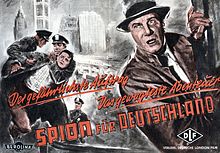Erich Gimpel
Erich Gimpel (born March 25, 1910 in Merseburg , † September 3, 2010 in São Paulo ) was a German spy during World War II . Together with William Colepaugh (March 25, 1918 to March 16, 2005) he was brought to the United States in 1944 as part of "Operation Elster" , where he was arrested by the FBI in New York City .
German secret agent
Gimpel worked as a radio operator for mining companies in Peru in the 1930s . At the beginning of the Second World War he became a secret agent and transmitted the movements of enemy ships to Germany. When the United States in December 1941 in the war occurred , Gimpel was after Germany recalled, as a result, he worked as an agent in Spain .
He then received training as a spy in Hamburg, after which he was assigned a job in The Hague , which was occupied by the Germans . There he first met the American William Colepaugh , who ultimately betrayed him. Even if Colepaugh was unreliable, Gimpel felt that he needed an American to carry out his mission in the United States.
As part of "Operation Elster", the two were brought to the USA in the U 1230 submarine and put ashore on November 29, 1944 at Hancock Point in the Gulf of Maine . Their task was to collect information about the progress of the Allies in the course of the war and to transmit it to Germany via an 80 watt radio station that Gimpel was to build.
Together they made it to Boston and then by train to New York City , where Colepaugh dropped off, visited and confided in an old school friend. The FBI was already looking for German agents because a Canadian ship had sunk near the Maine coast - suggesting the presence of a submarine - and because local residents had reported suspicious observations. Colepaugh's friend informed the FBI, which Colepaugh questioned. Colepaugh made a confession and enabled Gimpel to be caught.
Prisoner of war
After Gimpel's arrest, the spies were turned over to US military justice on the instructions of the Attorney General . In February 1945, they were tried in a military court on charges of conspiracy and violation of Article 82 of the Geneva Convention . They were found guilty and sentenced to death by hanging . However, execution was delayed by the unexpected death of President Franklin D. Roosevelt , due to the custom of not executing death sentences during national mourning . On June 23, 1945, the new President Harry S. Truman softened the death sentences to life imprisonment because the war in Europe was over and Colepaugh had cooperated with the FBI.
Gimpel was imprisoned in Alcatraz , where he became a chess partner of Machine Gun Kelly . After 10 years, Gimpel was pardoned in 1955 (Colepaugh 1960) and released from prison in Germany, later he emigrated to South America .
After imprisonment
Gimpel was the last person to be tried by a World War II US military tribunal.
His biography, written together with Will Berthold , in which he described his underground activities , was published in 1956 by Süddeutscher Verlag under the title Spion für Deutschland .
Several books on Nazi spies were published in the United States after the September 2001 terrorist attacks , with his book being reprinted under the title Agent 146 in 2003. He was interviewed by Oliver North for his Fox News program War Stories with Oliver North in the episode "Agent 146: Spying for the Third Reich".
He died in 2010 in São Paulo , Brazil .

Movie
The book was filmed in 1956 by Werner Klingler as a spy for Germany , the screenplay was written by Herbert Reinecker , Martin Held played the leading role, further roles were cast with Nadja Tiller , Walter Giller , Gustav Knuth , Günter Pfitzmann , Heinz Drache and other well-known actors. The film fell through with the film critics and the audience, however, because on the one hand it was based too much on Gimpel's book to be really exciting, but on the other hand contained too many implausible embellishments - including a love story with the American Joan - to be a factual report go through.
Individual evidence
- ^ [1] Lamphere, Robert J. and Schactman, Tom "The FBI-KGB war: a special agent's story", Mercer University Press, 1995, Page 7. ISBN 978-0-86554-477-2 . Accessed December 24, 2014
- ↑ [2] Book Review: Publishers Weekly , 2002, published on Amazon.com. Retrieved December 24, 2014
- ↑ Connelly, Sheryl: The sidekick from hell; how a Nazi agent was thwarted by his drunken partner . In: New York Daily News , January 19, 2003. Archived from the original on June 29, 2011.
- ↑ Film review in "Spiegel"
- ↑ The film "Spy for Germany (1956)" on IMDB
Web links
- Photo of Bullfinch on "Shark Hunters" (Engl.)
- Gimpel and Colepaugh (Eng.)
- Article about Colepaugh and Gimpel on fas.org
- Report on the interview with Colepaugh and Gimpel on ibiblio.org
- Report about Colepaugh and Gimpel on navy.mil (engl.)
- "The Story Behind Germany's World War II Invasion of Frenchman Bay," an interview with former CIA agent Richard Gay (Engl.)
- "G-Men grave Two Nazi Spies" (Engl.)
- Erich Gimpel in the NNDB database (English)
| personal data | |
|---|---|
| SURNAME | Gimpel, Erich |
| ALTERNATIVE NAMES | Miller, Frank (pseudonym); Green, Edward (pseudonym) |
| BRIEF DESCRIPTION | German spy in the USA |
| DATE OF BIRTH | March 25, 1910 |
| PLACE OF BIRTH | Merseburg |
| DATE OF DEATH | September 3, 2010 |
| Place of death | São Paulo |